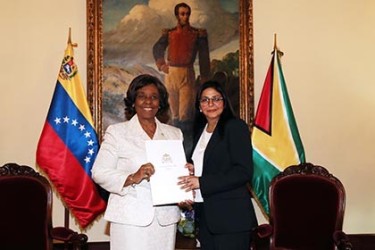More than six months after she was nominated, Guyana’s Ambassador to Venezuela Cheryl Miles was accredited by Caracas on Wednesday.
“As of yesterday, she presented her credentials to the Minister of Foreign Affairs of Venezuela. That fulfills an obligation that President [Nicolás Maduro had given in September last year,” Minister of Foreign Affairs Carl Greenidge said yesterday when questioned by PPP/C parliamentarian Gail Teixeira on Miles’ status.
Greenidge later told Stabroek News that Miles was asked by Caracas to present her credentials for agrément at 10am on Wednesday but the schedule was changed on short notice. She was later only received by Venezuelan Foreign Minister Delcy Rodríguez at 4:15pm on Wednesday.

In a statement announcing Miles’ accreditation, the Venezuelan Ministry of Foreign Affairs said that it coincided with the 50th Anniversary of the signing of the 1966 Geneva Agreement, which aimed to resolve the border controversy between the two countries, and fulfilled a commitment made by President Maduro in September last year. It, however, also reaffirmed its claim to Guyana.
Greenidge, when asked about the manner in which Miles was received and the later statement on her accreditation, said it was “how some governments operate” on occasion. “I am not aware that you can be prudent to refuse,” he added.
He also pointed out that what is important at this time is that Miles is able to perform her designated functions. “She can now operate fully as an ambassador like the Venezuelans have been operating here…,” he said.
Following a September 28th meeting called by UN Secretary General Ban Ki-moon in New York, both the Guyana and Venezuelan presidents agreed to receive their respective ambassadors. The relationship between the two countries has been deteriorating since last May, when Maduro issued a decree laying claim to most of Guyana’s territorial waters along the Essequibo Coast. That Decree was subsequently withdrawn and replaced with a new one that was still offensive.
We need ambassadors in place
Meanwhile, Teixeira criticised the delay in the naming and appointing of other foreign mission heads. “My concern is we have 13 missions and 10 are without heads,” she said.
She said as soon as government gets a list of confirmed persons who were nominated, it should be made public so as to allay speculation of who will be designated to fill the top posts.
She also said that it was her hope that when that list is eventually made available that it is not filled with elderly persons as young people should be given a chance to represent the country.
“My concern is that we need our Ambassadors and High Commissioners in place and that the best people are put forward to represent our country. By the way, I hope they are young people… how can we go to the world with people in their 70s and 80s? We need to have young people come up and be out there representing our nation,” she asserted.
Greenidge said stringent security checks were the reasons for the long delays in accreditation. “For the most part, the request for agrément has been submitted to host countries and for reasons I think have more to do with the preoccupation of our bilateral partners—terrorism and checking everybody’s background—this process has taken an unpresented amount of time,” he said.
He added that he hoped within the course of the next two weeks he will be in a position to report that a “significant amount” of diplomats have been received and when the opposition sees that list they “will agree both on the diversity and quality of persons selected.”
On the question of elderly persons filling the vacancies, the Foreign Minister reasoned that persons with necessary skills and experience in the relevant fields will help to impart those skills to their juniors, who will be apprenticed.









